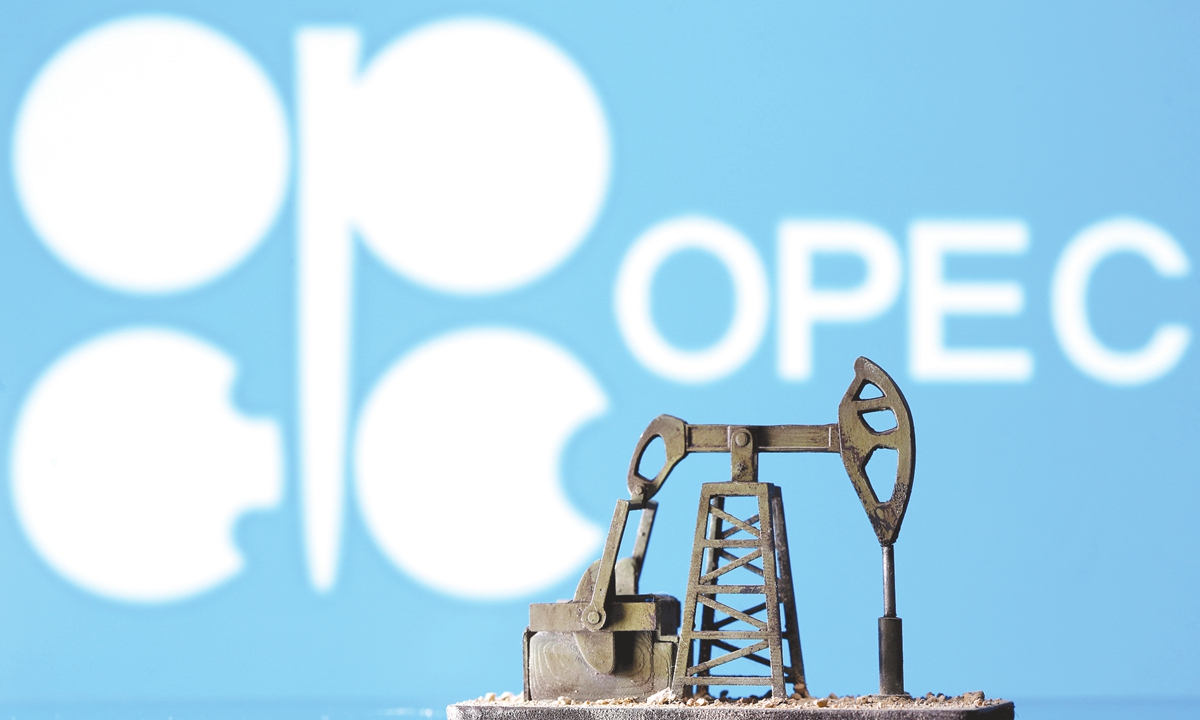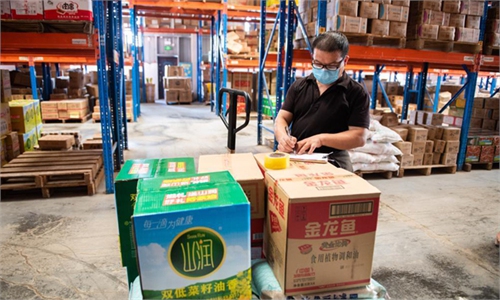
A 3D printed oil pump jack is seen in front of the displayed OPEC logo on April 14. Illustration: VCG
The Organization of the Petroleum Exporting Countries (OPEC) and its allies, a group known as OPEC+, has agreed to cut 100,000 barrels a day from crude output from October, reverting to the supply level for August.The move highlights the difficulties and awkwardness that the US and its allies are facing in trying to bring down oil prices to ease inflationary pressure through non-market means, especially at a time when their influence over oil-producing countries is waning.
As it turns out, the sanctions imposed by the US and its European allies against Russia have greatly destabilized global economic development, and have directly affected the development of many countries. If the West cannot provide a stable international environment for the peaceful development of the world, then they should not expect other countries to stand with them.
While the output reduction for October may only represent 0.1 percent of global demand, also a small fraction of daily crude production by OPEC+, it sends an unmistakable signal that OPEC+ will move to defend oil prices if necessary. Indeed, due to fears of a global economic slowdown, crude prices have been on a general decline since June, with Brent crude futures falling more than 20 percent from the price level in June.
Moreover, the OPEC+ production cut, which came just days after the Group of Seven, or G7, agreed to impose a price cap on Russian oil exports, is an unmistakable sign of the oil-producing countries' opposition to the West's geopolitical gambits at the expense of these countries as well as global markets.
Although certain non-market factors can affect the international energy market, the main determining factor for price trends has always been the relationship between market supply and demand. But now the G7 is attempting to use political measures to interfere with the long-standing economic laws in the energy market, with the view of curbing oil price surges to reduce inflationary pressure and hurt Russia's income from oil sales. However, while their target may be Russian oil only, this is bound to disrupt the entire supply system of the global energy market.
The US' European allies are facing energy crises because of their sanctions against Russia, leading to soaring inflation and growing political and social risks. Now they want to address the problem through imposing a price cap on Russian oil, but the difficulties in implementing such a plan indicate that oil prices are not something they can decide at will.
For starters, Russia has made it clear that it will not sell any oil to countries that participate in the oil cap plan. Second, China and India, the two largest buyers of Russian oil, are also unlikely to support G7's price cap plan in that such a move goes against their stance on sanctions against Russia.
Third, if a price cap on Russian crude was implemented under certain circumstances, there would be two kinds of oil prices in the international market, the normal crude price based on a market mechanism, and the capped prices of Russian crude. The obvious price difference would certainly result in arbitrage activities, and buyers would abandon high-priced oil for a low-priced option, eventually putting pressure on normal crude prices. This is clearly not in the interests of oil-producing countries.
It is therefore impossible for the US and Europe to ask other countries to sacrifice their own interests to align with their geopolitical strategic goals. Since the Russia-Ukraine conflict broke out, the US and its allies have tried to make others support their sanctions, but didn't bother to think why their baton is no longer working.
Quite simply, the West's waning influence is because of their abuse of power, selfishly disregarding and preying on the interests of other countries. How can the international community trust the West after all it has done? Among the most vicious deeds of the West, the Syrian government has long accused Washington of stealing natural resources in Syria, such as oil, gas and even wheat.
So the problems created by the West must be solved by themselves, not others. If the EU really thinks a price cap is necessary, then why not negotiate it with their US ally, which is known for its lucrative LNG sales to Europe?


